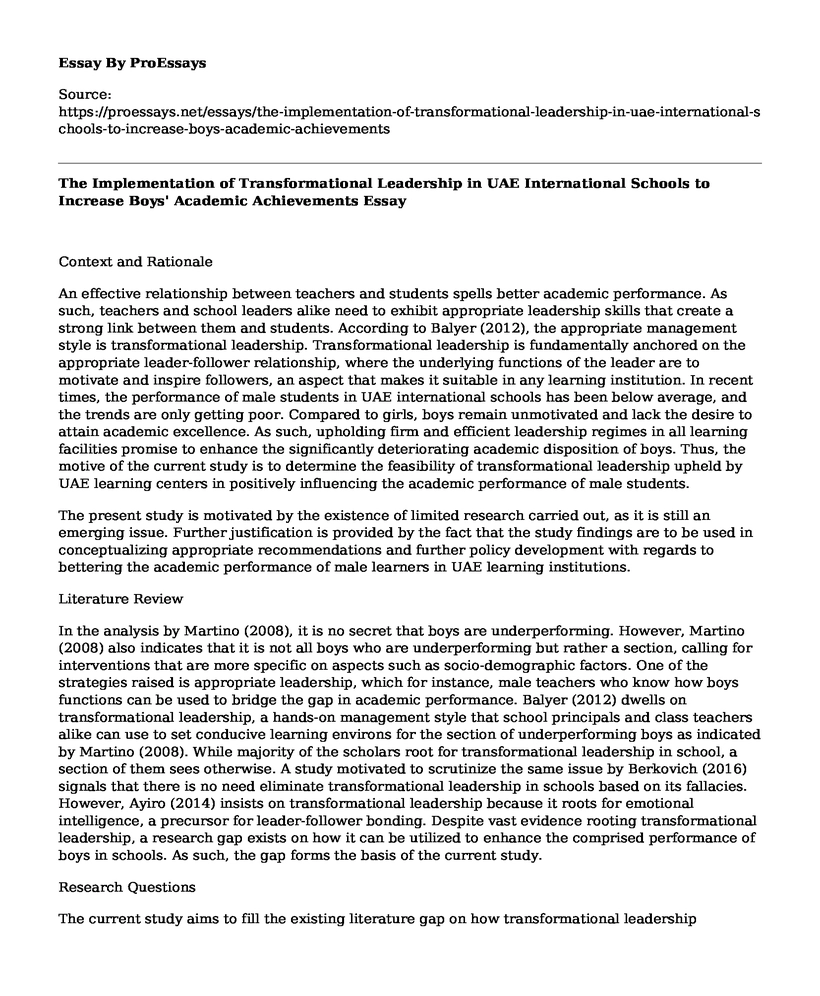Context and Rationale
An effective relationship between teachers and students spells better academic performance. As such, teachers and school leaders alike need to exhibit appropriate leadership skills that create a strong link between them and students. According to Balyer (2012), the appropriate management style is transformational leadership. Transformational leadership is fundamentally anchored on the appropriate leader-follower relationship, where the underlying functions of the leader are to motivate and inspire followers, an aspect that makes it suitable in any learning institution. In recent times, the performance of male students in UAE international schools has been below average, and the trends are only getting poor. Compared to girls, boys remain unmotivated and lack the desire to attain academic excellence. As such, upholding firm and efficient leadership regimes in all learning facilities promise to enhance the significantly deteriorating academic disposition of boys. Thus, the motive of the current study is to determine the feasibility of transformational leadership upheld by UAE learning centers in positively influencing the academic performance of male students.
The present study is motivated by the existence of limited research carried out, as it is still an emerging issue. Further justification is provided by the fact that the study findings are to be used in conceptualizing appropriate recommendations and further policy development with regards to bettering the academic performance of male learners in UAE learning institutions.
Literature Review
In the analysis by Martino (2008), it is no secret that boys are underperforming. However, Martino (2008) also indicates that it is not all boys who are underperforming but rather a section, calling for interventions that are more specific on aspects such as socio-demographic factors. One of the strategies raised is appropriate leadership, which for instance, male teachers who know how boys functions can be used to bridge the gap in academic performance. Balyer (2012) dwells on transformational leadership, a hands-on management style that school principals and class teachers alike can use to set conducive learning environs for the section of underperforming boys as indicated by Martino (2008). While majority of the scholars root for transformational leadership in school, a section of them sees otherwise. A study motivated to scrutinize the same issue by Berkovich (2016) signals that there is no need eliminate transformational leadership in schools based on its fallacies. However, Ayiro (2014) insists on transformational leadership because it roots for emotional intelligence, a precursor for leader-follower bonding. Despite vast evidence rooting transformational leadership, a research gap exists on how it can be utilized to enhance the comprised performance of boys in schools. As such, the gap forms the basis of the current study.
Research Questions
The current study aims to fill the existing literature gap on how transformational leadership enhances boys academic performance. As such, the following questions are used?
How does transformational leadership affect the overall academic performance of schools?
What are the main elements of transformational leadership that can be used to enhance academic output?
What are the appropriate transformational leadership skills that school leaders need adapt to foster good academic performance?
How can transformational leadership be customized by individual learning institutions to address the poor academic performance by boys?
Research Design and Methodology
Based on the fact that the agenda of the study is to assess transformational leadership in improving academic output of boys, the research design remains purely qualitative. The main mode of data collection will be interviews. Given the sensitivity of the issue under scrutiny, the interviews will be allocated a substantial period of time, where each session with a school leader will be recorded and stored digitally for further analysis (Gill et al. 2008).
Theoretical Perspective
The current study is qualitative in nature. As such, a positivist, also referred to as the experimental approach is preferred. The main agenda is to extrapolate the superiority of transformational leadership in enhancing academic performance, an aspect that makes it necessary to trade on the realistic disposition of the situation.
Ethical Consideration
Regardless of the issue under scrutiny being less sensitive, the proposed analysis will adhere to appropriate ethical standards. An accomplished research should be able to ensure that every aspect from participant selection to the process of data collection is morally acceptable. For instance, information from each interviewee will be kept confidential and not a subject for discussion by other participants. This will be made sure off by having each participant interviewed on different days.
Data Analysis
The raw data obtained will be qualitatively analyzed. Content analysis of the digitally recorded interview sessions will be performed for further recommendations.
Word Count: 750
References
Ayiro, L.P., 2014. Transformational Leadership and School Outcomes in Kenya: Does Emotional Intelligence Matter?. In FIRE: Forum for International Research in Education 1(1), pp. 26-49.
Balyer, A., 2012. Transformational leadership behaviors of school principals: A qualitative research based on teachers perceptions. International Online Journal of Educational Sciences, 4(3), pp.581-591.
Berkovich, I., 2016. School leaders and transformational leadership theory: time to part ways?. Journal of Educational Administration, 54(5), pp.609-622.
Gill, et al., 2008. Methods of data collection in qualitative research: interviews and focus groups. British dental journal, 204(6), pp.291-295.
Martino, W., 2008. Boys' Underachievement: Which Boys are We Talking About?. Ontario, Literacy and Numeracy Secretariat.
Cite this page
The Implementation of Transformational Leadership in UAE International Schools to Increase Boys' Academic Achievements. (2021, Apr 08). Retrieved from https://proessays.net/essays/the-implementation-of-transformational-leadership-in-uae-international-schools-to-increase-boys-academic-achievements
If you are the original author of this essay and no longer wish to have it published on the ProEssays website, please click below to request its removal:
- The Teamwork Research Example
- The Phenomenon of Leadership Essay Example
- Paper Example on Legal Issue in Information Security
- Issue Analysis Paper Example: School Funding
- Essay on Understanding Team Members' Behaviors for Optimal Group Performance
- Paper Example on RFID: Automating Industries for Cost-Saving & Efficiency
- Essay Example on Principal-Led Instruction: Aligning School Vision to Achieve Goals







